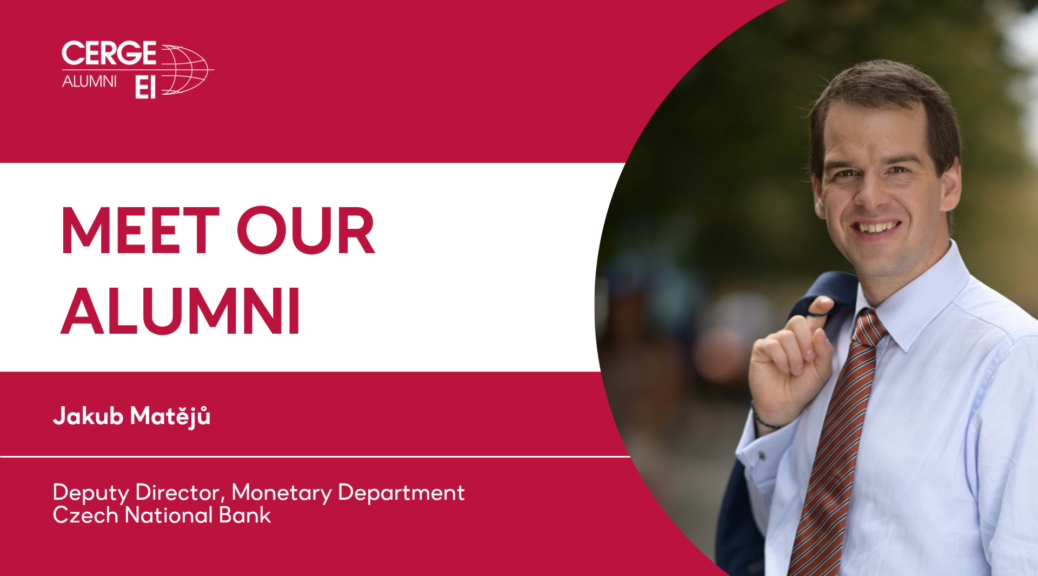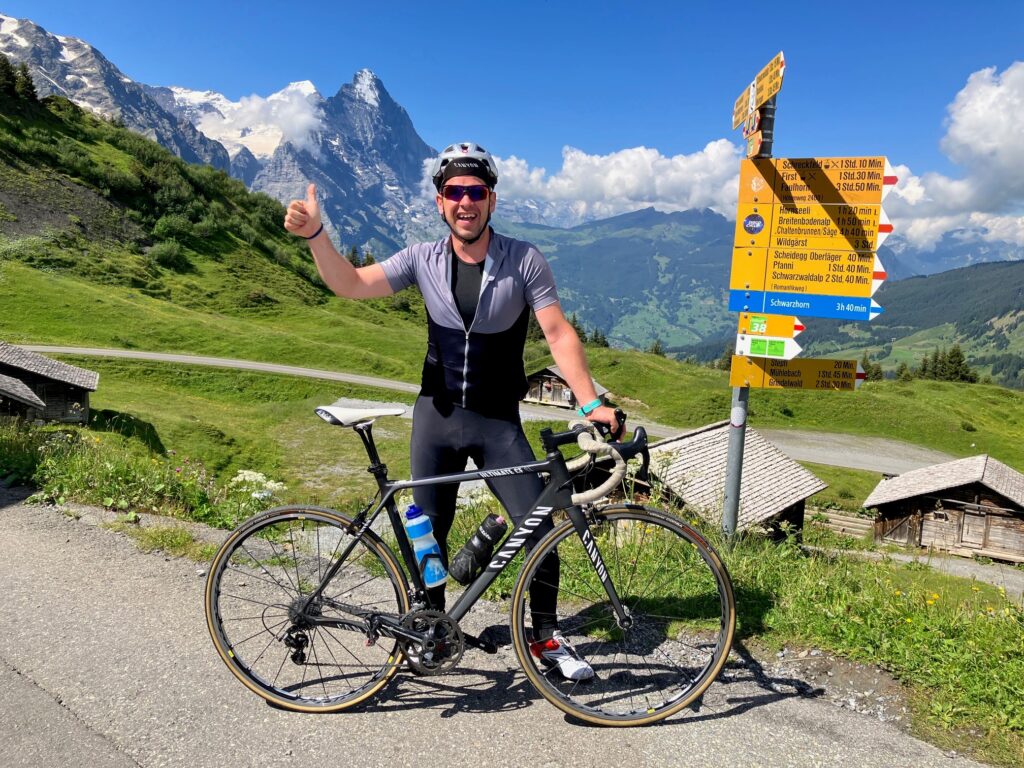For our latest alumni interview, we had the pleasure of speaking with Jakub Matějů, a CERGE-EI graduate and Deputy Director of the Monetary Department at the Czech National Bank. Jakub shared his insights from both the Czech National Bank and the European Central Bank, discussed key professional challenges, and offered advice to current students aspiring to follow a similar path.
Jakub, it seems you were set on a career in central banking from the beginning of your studies. Could you share what motivated you to pursue this path and how your studies at CERGE-EI helped to shape your career?
First I want to say hi to all CERGE-EI students, staff and other potential readers!
You are right that I was focused on monetary policy and central banking from very early on. This passion started already in high school; I wanted to do something technical using math, while still focused on people and their behavior within society. And I also wanted to understand how the markets operate, what lies at their core, what the fabled meeting of supply and demand really looks like in practice. How is the exchange rate determined? What is the role of interest rates? I saw the central bank’s decisions being widely discussed in the news, with a lot of respect towards the experts. I knew I wanted to be there at some point.
CERGE-EI was a natural step on this path after completing the Charles University Economics program at the Institute of Economic Studies. I was amazed at the cutting-edge PhD education in economics you can get in Prague. This really is something exceptional. The studies and your growth as a researcher are very demanding here, on par with top US and western EU programs. It requires a lot of energy and effort, for which you get the ticket to the club of top economists in the world. The door is open, the rest is up to you.
You’ve had the unique experience of working at both the Czech National Bank and the European Central Bank. How do the approaches to monetary policy differ between these institutions, and how did your time at the ECB influence your perspective?
Although modern monetary policy relies on the same principles in nearly all central banks in developed countries (we generally aim to stabilize inflation close to the target using available tools), the working environment can be very different. The Czech National Bank is responsible for a medium-sized European country, very open to what happens abroad. The analytical team here is relatively compact and our experts often interact directly with the Board, which then makes the decision. You have an immediate impact and direct feedback. There is a lot of responsibility which comes with this proximity to decision-making.
On the other hand, the European Central Bank works more as a huge think-tank. The ECB building itself is full of excellent economists, big names. You work with them on a daily basis and meet for lunch and coffee, write joint policy papers. Another dimension is the international scope. For example, I was responsible for house price forecasting and valuations for 27 countries, including coordination of an expert group which developed models for these purposes. It is no easy task to forge a consensus among national central bank experts from all around the EU27. Certainly a very motivating place to work and a great experience!
As Deputy Director of the Monetary Department at the Czech National Bank, you play a key role in shaping monetary policy. What have been some of the most significant challenges you’ve faced in this role?
What I love about this role is that almost every day and every situation feels exceptional. This is the nature of modern monetary policy-making—you never know exactly where you are, e.g. if inflation pressures are finally gone or will silently start growing again, if the economy is at the edge of a recession or at the start of a boom. Often you can persuasively argue both views. Every day you are at a crossroads which determines where the future will evolve. Even the best available data and most advanced models can give you only limited information about the true situation and the actions you should take. That doesn’t mean you should stop using these tools—quite the opposite! But in such an uncertain environment, the key challenge may not be technical, but interpersonal. The experts inside the bank can argue and disagree (for good reasons), but the bank as a whole should present a clear, understandable and reliable strategy to convince the public that inflation will indeed stay at 2%. If this communication is successful, most of the battle is already won.
In this respect, the episode of double-digit inflation in 2022-23 was very challenging. And coming back to the irreplaceable role of research, analytical data work and forecasting models, these can help not only with understanding the situation, but also with the credibility of the policy. This is why we are now conducting a “Monetary Policy Review” of our methods by international experts, aiming to get even better in macroeconomic analysis and forecasting.
During your tenure as an advisor to the Board of the Czech National Bank, what were some of the most critical decisions or discussions you were involved in?
The advisor role is great in that you work directly with a Board member and are very close to decision-making. The agenda is also very broad. It might be surprising that monetary policy amounts only to around 20 % of the time of the Board; it is the icing on the cake. The rest is banking supervision and licensing, financial stability, market regulation, cooperation with government and international bodies, cash management and market infrastructure, foreign exchange reserve management and dealing, legal issues… I needed to quickly learn, for example, to read legal texts, but also the tasks related to the management of big institutions. To name a few critical moments, a once-in-a-lifetime moment was the outbreak of the COVID-19 pandemic. Everyone was scared, the big central banks started slashing interest rates, the koruna exchange rate depreciated. Staff moved to home office. We dug into the unknown world of pandemic models and explored comparable historical episodes (problem: there weren’t any)! In an emergency meeting on 16th March 2020, the Board cut rates by 50basis points not knowing if the economy would get back to business in the foreseeable future or if this is the end of the world as we know it. The economy adapted remarkably well and fast, but who could have known back then? Another such occasion was the horrible Russian aggression against Ukraine. Amidst very high market uncertainty, the Board decided to limit the depreciation of the koruna (which would worsen the already deteriorating inflationary situation) using FX interventions. This was a powerful signal that the CNB values FX stability and is willing to use its huge reserves, and had an immediate stabilizing effect on the market. These moments were not easy and in some ways disrupted the ways things had been done before.
What advice would you give to current CERGE-EI students and recent graduates who aspire to work in high-level positions within central banking or international economic institutions?
Build your networks. Proceed step by step, first focusing on your studies. Already at this stage, talk to people, build your own brand. Be “that smart girl who works on yield curve models” or whatever you do. Apply to positions, don’t be afraid of rejections, and grab the chance if you get it. Don’t doubt yourself too much (you already achieved a lot)! Be positive.
I am very grateful to have the chance to work with an extremely smart and motivated team. Many of our best researchers come from CERGE-EI. Some other graduates are very successful macro analysts, “central bank watchers”. Some are at big central banks, international institutions. Use these connections. That does not mean everything is served on a gold plate—you have to work hard to succeed. But CERGE-EI is a great springboard for that.
Outside of economics and central banking, what are some of your personal passions or hobbies that help you unwind and recharge?
Being a father of three boys, family pretty much fills my free time. I still keep some personal hobbies—I do (and also follow) roadbike cycling; it is very time efficient (I can get destroyed in a short time J) and can be done while commuting to work. The peak of the season is always a big one-day trip with friends—we have cycled from Prague to Berlin in a day, another year to Vienna, this year to Wroclaw. Amazing how far can you get using only your own power. Cycling the alpine roads and passes is also fantastic, as is generally any time spent in the mountains. Previously I also did quite a lot of mountain climbing—I would love to get back to it again! It is also great to do more and more of such activities with my young sons as they grow.

